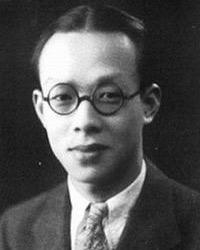 W
WChang Kia-ngau, courtesy name Gōngquán (公权), was a Chinese banker, politician, and scholar. He was an influential figure in the history of modern Chinese central bank.
 W
WKwang Pu Chen was a Shanghai-based Chinese banker and State Councillor. He was the founder of the first modern Chinese savings bank, the Shanghai Commercial and Savings Bank, the Shanghai Commercial Bank, a travel agency, as well as the China Assurance Corporation Ltd.
 W
WDee Ching Chuan (李清泉) was a prominent Chinese businessman, philanthropist, and activist known as the Philippine "Lumber King" during the American colonial rule. He was the youngest president of the Philippine Chinese General Chamber of Commerce from 1919 to 1924 and founded China Banking Corporation in 1920. He also founded Chinese language newspapers Chinese Commercial News and Fookien Times.
 W
WGao Xiqing is the former Vice Chairman, President and Chief Investment Officer of the China Investment Corporation, one of China's sovereign wealth fund.
 W
WHu Guangyong (1823–1885), better known by his courtesy name Xueyan, was a businessman in China during the latter Qing dynasty. He was active in banking, real estate, shipping and Chinese medicine. He was involved in the salt, tea, clothing, grain as well as the arms trade.
 W
WJiang Chaoliang is a Chinese politician and investor. In the past, he has served as the governor of Jilin province in Northeast China, and an executive at China Development Bank and the Agricultural Bank of China. Jiang is also an member of the 19th Central Committee of the Communist Party of China. In February 2020, he was dismissed as the Communist Party Secretary of Hubei.
 W
WJiang Jianqing is the former Chairman of the Industrial and Commercial Bank of China (ICBC), the world's largest bank by assets and 2nd market value; he held the position from 2005 to 2016.
 W
WKung Hsiang-hsi, often known as Dr. H. H. Kung, was a Chinese banker and politician in the early 20th century. He married Soong Ai-ling, the eldest of the three Soong sisters; the other two married President Sun Yat-sen and the latter President Chiang Kai-shek. Together with his brother-in-law, Soong Tse-ven, he was highly influential in determining the economic policies of the Kuomintang-led Nationalist government of the Republic of China in the 1930s and 1940s.
 W
WCharles Li Xiaojia, is a Chinese banker. He was the Chief Executive of the Hong Kong Exchanges and Clearing Limited (HKEX) from 2010 to 2021.
 W
WLi Ming was a Chinese banking and investing pioneer. He formed the Chekiang Industrial Bank in 1922 and was General Manager and later Chairman until 1949. Over the course of his career he held more than thirty directorships in banks, industrial concerns, insurance companies and public utilities, and served in many key governmental positions of financial administration. He was a founder and Chairman of the Shanghai Bankers' Association.
 W
WLi Ruogu is a Chinese banker. He served as Chairman and President of the Export-Import Bank of China from 2005 to 2015.
 W
WLi Zhaohuan, also known as Juwan Usang Ly, was a Chinese educator, politician and banker. He served as President of National Chiao Tung University and the last President of Hangchow University.
 W
WLiu Mingkang is a former Chinese politician, public servant and economist from China. He graduated from the University of London in 1987. In 1988 he received an MBA from the Cass Business School. He served as chairman of the China Banking Regulatory Commission from its creation in 2003 until he reached the retirement age of 65. During his tenure he was responsible for putting in place an effective regulatory structure which helped the Chinese banking system weather the global financial crisis and emerge relatively healthy and well capitalized.
 W
WLiu Shangqing was a Chinese politician. He was also known by the courtesy name Haiquan (海泉).
 W
WQi Yaoshan, courtesy name Zhaoyan, was a statesman and government official in the Qing dynasty and Republic of China. He was born in Yitong County, Jilin.
 W
WJing Ulrich, née Li (李晶), is the managing director and vice chairman of global banking and Asia Pacific at JPMorgan Chase. She provides strategic advice to the firm’s most senior clients across all sectors and asset classes, including advisory and capital raising for transformative companies in the technology, mobility, healthcare, and consumer markets. Educated at Harvard and Stanford universities, Ulrich helps foster greater cross-border collaboration, building relationships with executives from Asia's leading enterprises, private equity and sovereign wealth funds, and prominent multinationals.
 W
WXiao Gang was the chairman of the China Securities Regulatory Commission from March 2013 until 20 February 2016. He was previously chairman of the board of directors of Bank of China Limited, of the Bank of China Limited, and deputy governor of the People's Bank of China, the central bank of the People's Republic of China. He has been credited for playing a crucial role in the reform of China's banking sector.
 W
WZhou Youguang, also known as Chou Yu-kuang or Chou Yao-ping, was a Chinese economist, banker, linguist, sinologist, Esperanto-speaker, publisher, and supercentenarian, known as the "father of Pinyin", a system for the writing of Mandarin Chinese in Roman script, or romanization, which was officially adopted by the government of the People's Republic of China in 1958, the International Organization for Standardization (ISO) in 1982, and the United Nations in 1986.